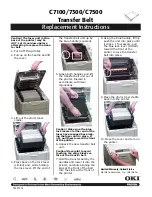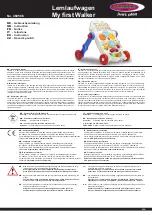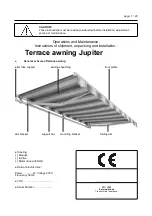
9
8
un casque à votre taille
Pour que le casque protège efficace-
ment tout en étant confortable, il doit être
parfaitement adapté à son utilisateur.
Le choix de la bonne taille est essentiel.
•
Mesurez votre tour de tête à l’aide d’un mètre
ruban en le positionnant environ à 2 cm au-
dessus des sourcils, c’est à ce point que votre
tour de tête est le plus grand. Une fois la mesure
relevée, comparez-la avec le tableau des tailles.
•
Essayez la taille du casque EvoLine series3 la
plus proche de la mesure obtenue, commencez
vos essais par la taille inférieure de votre tour de
tête. Si vous ressentez un point de contact trop
dur, essayez la taille supérieure. Vous devez être
maintenu assez fermement mais sans ressentir
de douleurs.
•
Les essais de taille doivent être
effectués jugulaire serrée (merci de vous
reporter au paragraphe en page 12-15 pour le
verrouillage de la jugulaire). Vérifiez que vous
ayez une bonne visibilité verticale et horizontale.
Vérifiez que votre tête puisse effectuer tous ces
mouvements sans gêne particulière.
•
Vérifiez que jugulaire serrée, le casque ne
puisse pas se «déchausser» de votre tête
lorsque vous essayez de le faire basculer avec
vos mains sur l’avant en forçant. Si le casque
sort ou est à la limite de sortir, il est soit trop
grand, soit la jugulaire n’est pas bien serrée.
Renouveler l’essai jusqu’à trouver la taille idéale.
attention :
même pour un parcours très court,
ne prêtez pas votre casque si la taille n’est pas
parfaitement adaptée.
Il est absolument indispensable que lors de
toute utilisation votre casque soit bien posi-
tionné (page 12-15).
Vérifiez que la tension de la jugulaire soit cor-
rectement ajustée selon instructions (page
12-15)
a helmet in your size :
For a helmet to provide effective protection
while remaining comfortable, it has to be per-
fectly suited to its user. Choosing the correct
size is essential.
•
Measure the circumference of your head with
a tape measure, positioning it about 2 cm above
your eyebrows : this is
where your head is the largest. Once you
have taken this measurement, compare
it to the table of sizes. Try the size of
EvoLine series3 helmet closest to the measu-
rement obtained, starting with the size smaller
than your head measurement. If you feel that
the contact is too hard, try the size larger.
Your head should be held quite firmly but
you should feel no discomfort.
•
Tests for size must be carried out with
the chin strap tightened (please refer to
the section on page 12-15 for instruc-
un caSque à votre taille • a helmet in your Size • ein helm
in ihrer GröSSe • un caSco Su miSura • un caSco a Su medida
un caSque à votre taille • a helmet in your Size • ein helm
in ihrer GröSSe • un caSco Su miSura • un caSco a Su medida
Sizing (cm)
XS
53/54
S
55/56
M
57/58
L
59/60
XL
61
tions on tightening the chin strap). Check
that you have good vertical and horizontal
visibility.
Check that your head can carry out all of
these movements without any particular dis-
comfort.
•
Check that when the chin strap is
tightened, the helmet cannot be removed from
your head when you try to move it forward by
force.
If the helmet comes off or nearly comes
off, it is too big or else the chin strap
is not correctly tightened. Keep trying
on helmets until you find the ideal size.
WarninG :
do not lend your helmet, even for
a short journey, if its size is not perfectly sui-
table. For each use of your helmet, it is abso-
lutely necessary to make sure that the helmet
is well positioned on your head, and that the
chin strap is properly adjusted, following the
instructions of this manual
(see page 12-15).
ein helm in ihrer Größe :
Damit der Helm richtig funktionieren kann, muss
er seinem Benutzer perfekt angepasst sein. Die
Wahl der richtigen Größe ist dabei wesentlich.
•
Messen Sie Ihren Kopfumfang mit
einem - Maßband, indem sie es ungefähr
2 cm über den Augenbrauen positionieren.
An dieser Stelle ist Ihr Kopfumfang am
größten. Vergleichen Sie das Messergeb-
nis mit der Größentabelle. Probieren Sie
die EvoLine series3 aus, die dem Messer-
gebnis am nächsten liegt. Beginnen Sie
Ihre Tests mit der unteren Größe für Ihren
Kopfumfang.
Wenn Sie einen zu harten Druck spüren,
versuchen Sie die nächste Größe. Ihr Kopf muss
recht fest gehalten werden, darf jedoch nicht
schmerzen.
•
Die Größentests müssen mit dem
festgezogenen Kinnriemen erfolgen (siehe Seite
12-15). Überprüfen Sie, ob Sie eine einwand-
freie vertikale und horizontale Sicht haben.
Überprüfen Sie, ob Ihr Kopf alle Bewegungen
ohne besondere Beeinträchtigung machen
kann. Stellen Sie sicher, dass sich der Helm
bei festgezogenem Kinnriemen nicht von Ihrem
Kopf «abstreifen lässt», wenn Sie versuchen, ihn
mit Ihren Händen heftig nach vorne zu kippen.
Wenn sich der Helm löst oder fast löst, ist er
entweder zu groß oder der Kinnriemen wurde
nicht richtig fest-gezogenem. Probieren Sie
so lange, bis Sie die optimale Größe gefunden
haben.
achtunG :
Leihen Sie Ihren Helm auch nicht
für eine sehr kurze Strecke aus, wenn die Größe
nicht perfekt angepasst wurde. Bei jedem Ga-
brauch Ihres Helmes ist es unbedingt nötig sei-
nen richtigen Sitz auf Ihrem Kopf sicherzustellen
und dass der Kinnriemen entsprechend der






































